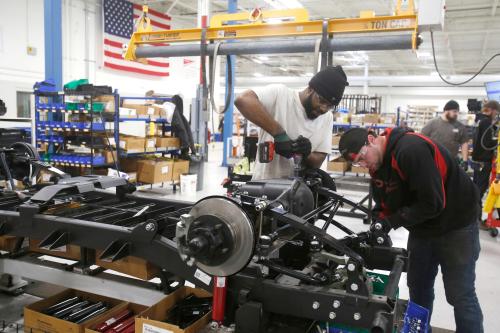These video clips are part of a keynote address made by Joe Biden at the launch event for Brookings’ Future of the Middle Class Initiative on May 8, 2018.
It’s debate time! June 26th and 27th see the first round of the Democratic Party nominee debates. Plenty of eyes will be on on current front-runner, Joe Biden. So far his campaign has been relatively light on policy, but there are sure to be some sharp policy disagreements on the stage. So if Biden manages to remove the V from VP, how will he govern?
Last fall, Biden delivered the keynote address at the launch event for the Future of the Middle Class Initiative at Brookings. He spoke on several important topics, many of which are likely to feature on the debates. Here is a selection of his comments:
The Importance of the Middle Class
Biden credits the middle class for promoting political stability, breeding opportunity, and serving as an inspiration for struggling Americans. When the middle class does well, everyone benefits.
The Reality of Wage Stagnation
The former Vice President highlights the issue of wage stagnation by stating that productivity no longer drives wages. He remarks that despite “delivering more,” workers are now receiving “a lot less.”
The Threat of Automation
Biden addresses the problem of automation by reflecting upon the struggles of a former classmate, emphasizing the threat that he believes automation poses for many working-class Americans and their families.
The Need for a Progressive Tax Code
Biden wants to develop a more progressive tax code and states that the most recent tax cut served to benefit those who are already on top. He calls for revising the current structure in order to create a tax code that benefits workers, eliminates loopholes, and raises revenue for social programs.
The Loss of Bargaining Power
Noting that workers have lost leverage, Biden wants to empower working-class Americans. He suggests that a competitive labor market is necessary to protect employees from exploitation.
A Call for Free College
Biden remarks that for many, a high school education is no longer sufficient. To address this problem, he proposes making both colleges and community colleges free for any student seeking to pursue higher education.
An Emphasis on Infrastructure
The Democratic candidate believes that advances in infrastructure, including roads, bridges, airports, waterways, and broadband, are necessary in order to compete with the rest of the world.
The Struggles of the Forgotten Americans
Biden recognizes that many Americans feel that they have been left out of the equation and acknowledges the detrimental impacts surrounding these sentiments. He recommends expanding policies and programs so that all Americans can succeed, regardless of their zip code.
The Benefits of Affordable Childcare
For the current front-runner, providing tax cuts for childcare is far more important than giving tax breaks to the rich. Biden suggests that affordable childcare would be beneficial for women, and for economic productivity.
An Appeal for Respect
Biden calls for Americans to show respect to members of all socioeconomic backgrounds. He notes that many working-class people often go underappreciated, and that it is important to recognize the value of all occupations.
Overall, Vice President Biden positions himself above all as an advocate and supporter of the middle and working class. As on the campaign thus far, he painted in broad strokes but with clear themes: of universal values, shared respect, and economic reforms aimed at lifting incomes and wages. Time will tell how this translates into more detailed policy proposals, and how it translates into support from the Democratic electorate.
The Brookings Institution is committed to quality, independence, and impact.
We are supported by a diverse array of funders. In line with our values and policies, each Brookings publication represents the sole views of its author(s).








Commentary
Joe Biden’s ideas to help the middle class
June 26, 2019